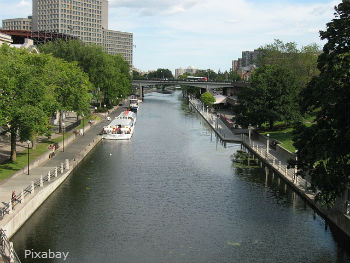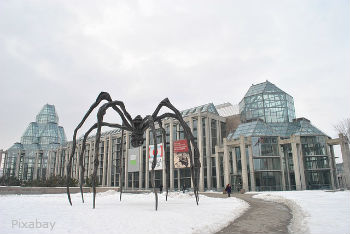Ottawa is Canada’s  capital and was founded as “Bytown” in the 19th century. The name “Ottawa” is an anglicized version of an Algonquin word meaning “to trade.” Ottawa’s position at the meeting point of three major rivers certainly makes it essential for trade and transportation. Do you want to move to Canada’s capital city? This guide will tell you everything you need to know about the heart of the National Capital Region.
Ottawa's Climate
The Köppen Climate system classifies Ottawa’s climate as “humid continental.” It has four distinct seasons, including hot summers and cold winters. The average summer high is 26 degrees Celsius, while the winter’s average low is -15. You’ll experience a full range of temperatures if you live in Ottawa year-round.
Ottawa receives about 940 millimetres of precipitation each year, including the melted water from 224 centimetres of snow. Snow and ice are common during the colder months, so prepare for winter conditions if you’re moving into the area.
Tip: Ottawa is located on a fault line, so it occasionally experiences earthquakes. Since 2000, Ottawa has had a roughly 5.0 magnitude earthquake about once every four years.
Ottawa's Neighbourhoods
Ottawa is made up of several neighbourhoods that range from urban to rural within its city limits. The city has annexed many smaller towns and villages to grow larger and more diverse. Gloucester, Nepean and Vanier were independent cities, but are now parts of Ottawa’s urban centre.
Ottawa’s Greenbelt isn’t one neighbourhood per say, but it certainly enhances the surrounding neighbourhoods. The government developed this large controlled area in the 1950s to add some natural beauty to the city and prevent urban sprawl. As a result of this city planning, many Ottawa neighbourhoods, such as Marlborough, have legitimately rural conditions.
Ottawa also has many culturally unique neighbourhoods. About 20 percent of the population is foreign-born, with most coming from the UK or China. The city has many bilingual speakers -- 38 percent of the population speaks both French and English. Native language can define neighbourhoods--for example, Ottawa’s Northeastern districts have the highest concentration of native French speakers.
 Registering Your Car in Ottawa Registering Your Car in Ottawa
To register your vehicle after you move to Ottawa, you need the necessary permits as per Southern Ontario regulations (note that most fees associated with receiving plates, numbers, inspections and certifications are more expensive for Southern Ontario).
If you have the proper license, insurance, receipts, and a relatively new vehicle, you should be able to register and drive it in Ontario without any problem. For more information on registering in Southern Ontario visit Service Ontario’s website. Ottawa Transportation
As the country's capital, Ottawa is fully connected to Canada and the rest of the world. Its main airport is the Ottawa Macdonald-Cartier International Airport, but there are other smaller airports in the region, such as the Gatineau-Ottawa Executive Airport and the Ottawa/Carp Airport. Multiple highways and inter-city railways help keep land traffic moving in and out of the National Capital Region.
There are a few public transit options for commuters within the city. OC Tanspo runs the system and provides customers with several classes of buses that have varying schedules, routes, and speeds. Some buses have their own dedicated lanes, and others have special right-of-way advantages. This variety is meant to minimize delays and allow commuters to only pay for specialized service when needed. The city’s O-train light rail system provides commuters with even more options for getting to work. Currently, the Confederation Line is being constructed to run through downtown and expand the O-train’s network. It is slated for completion in 2018.
Ottawa is cyclist-friendly if that’s your preferred commuting method. Most roads have wide shoulders and some even have dedicated bike lanes with protective walls. There are over 220 kilometres of paths for cyclists and pedestrians to enjoy.
Ottawa Schools
Ottawa is known as one of the most educated cities in Canada, with the highest per capita concentration of residents with PhDs in the country.
Ottawa has four separate public school boards, comprised of an English-speaking secular board, a Catholic board and their francophone counterparts. The Ottawa-Carleton District School Board is the secular English-speaking district, and handles the most schools in Ottawa. The University of Ottawa, (formerly the College of Bytown) is the city’s largest public university. This prestigious school is the biggest English-French bilingual university in the world.
Ottawa houses many more public and private colleges and universities, but all students in the area can take advantage of the city’s library. The Ottawa Public Library has been assisting intellectuals with their studies since 1906 and was constructed as part of the Carnegie Library System. It has over 2.3 million items in its venerable catalogue. Ottawa's Economy
Ottawa is one of the highest income cities in Canada. Unemployment is low and its many federal government jobs provide economic stability. Canada’s federal government is Ottawa’s number one employer--over 110,000 government employees work in the National Capital Region. 
High-tech industries also help drive the city’s economy. Ottawa’s high concentration of tech companies earns it the nickname, “Silicon Valley North.”
Some tech giants that call Ottawa home include:
- Corel
- Cognos
- JDS Uniphase
- Mitel
- Nortel
These companies primarily work on telecommunication, environmental technology, and software development.
Ottawa's Cost of Living
Ottawa’s status as a capital city and its residents' high income make its cost of living moderately expensive. Still, it is generally more affordable than other Canadian cities like Toronto, Edmonton, and Vancouver.
Gas: $1.23 per gallon
Renting a furnished 900 square foot apartment in the heart of the city: $1,760 per month
Utilities: $137 each month
Public transportation: $100 each month
These numbers are averaged estimations and can change over time. Visit Expatistan or Numbeo for updated cost of living calculations. Ottawa's Culture and Contemporary Life
 Ottawa has 25 UNESCO World Heritage Sites for those interested in Canada’s history. Lower Town is an especially historic section of the city where many memorials of Ottawa’s days as Bytown are on display. Ottawa has 25 UNESCO World Heritage Sites for those interested in Canada’s history. Lower Town is an especially historic section of the city where many memorials of Ottawa’s days as Bytown are on display.
The Golden triangle is a residential neighbourhood meets the hustle and bustle of downtown shops, galleries and restaurants. This high-traffic area offers many modern venues for tourists and residents to enjoy.
Ottawa also has many museums to attend. The National Gallery of Canada is the biggest museum in the city and is home to the Maman sculpture, which is an arachnophobe’s worst nightmare (the unique landmark is a 9-metre brass spider!). Canada’s most visited museum, the Canadian Museum of History, is just across the Ottawa River in Gatineau.
Ottawa has a museum for every taste. Other hotspots in the city include:
- Canadian War Museum
- Canada Agriculture Museum
- Canada Aviation and Space Museum,
- Canada Science and Technology Museum
- Billings Estate Museum
- Bytown Museum
- Canadian Museum of Contemporary Photography
- Canadian Ski Museum
- Currency Museum
- Portrait Gallery of Canada
Ottawa also hosts many seasonal festivals, featuring Winterlude as one of Canada’s biggest events. There are similar winter festivals in many Canadian cities, but this is the only skating, ice sculpting and snow flinging extravaganza directly funded by the federal government.
In 2010, Ottawa actually received an award from the International Festival and Events Association for its festival industry.
Here are some other Ottawa festivals to check out:
- Bluesfest
- Ottawa Dragon Boat Festival
- Ottawa international Jazz Festival
- Folk music Festival
- Various Canada Day celebrations
Ottawa Moving Resources
Are you ready to move to Canada’s capital? Topmoving.ca can get you in contact with professional moving companies to move your belongings into, within or out of Ottawa. Get at least three quotes from different companies for any service you need to determine a fair price for your move.
Ottawa Relocation Tips
- Bring both hot and cold weather clothing if you plan on moving to Ottawa permanently.
- Attend Winterlude, one of Canada’s biggest festivals.
- Look for jobs within the federal government--it is an industry that will always be active.
- Research your new neighbourhood to ensure that it is what you want before you move in. Ottawa has both rural and urban housing options.
Helpful Links
|